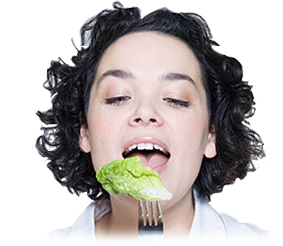Weight Loss SmartSiteTM | ||||||||||||||||||
Diet after gastric bypass surgeryDescriptionYou had gastric bypass surgery. This surgery made your stomach smaller by closing off most of your stomach with staples. It changed the way your body handles the food you eat. You will eat less food, and your body may not absorb all the calories from the food you eat. Your doctor, nurse, or dietitian will teach you about foods you can eat and foods you should avoid. It is very important to follow these diet guidelines. When you go home from the hospitalYou will eat only liquid or puréed food for 2 to 3 weeks after your surgery. You will slowly add in soft foods, and then regular foods. When you start eating solid foods again, you will feel full very quickly. Just a few bites will fill you up. This is because your new stomach pouch holds only a small tablespoon of food at first, about the size of a walnut. Your pouch will naturally get larger over time. You do not want to stretch it out very much, so do not eat more than your doctor, nurse, or dietitian advises. When your pouch is larger, it will hold about 1 cup of chewed food. A normal stomach can hold up to 4 cups of chewed food. You will lose weight quickly in the first 3 to 6 months after surgery. You may continue to lose weight more slowly up until about a year after surgery. During this time, you may have these symptoms:
These symptoms are normal. They should go away as you take in more protein and calories, and your body gets used to your weight loss. A new way of eatingRemember to eat slowly and chew each bite very slowly and completely. DO NOT swallow food until it is smooth. The opening between your new stomach pouch and your intestines is very small. Food that is not chewed well can block this opening.
Some foods you eat may cause some pain or discomfort if you do not chew them completely. Some of these are pasta, rice, bread, raw vegetables, and meats. Adding a low-fat sauce or gravy can make them easier to digest. Other foods that may cause discomfort are dry foods, such as popcorn and nuts, or fibrous foods, such as celery and corn. You will need to drink up to 8 cups (64 ounces) of water or other calorie-free liquids every day. Follow these guidelines:
Follow your diet carefullyYou will need to make sure you are getting enough protein, vitamins, and minerals while you are losing weight quickly. Eating mostly protein, fruits, vegetables, and whole grains will help your body get the nutrients it needs. Protein may be the most important of these foods. Your body needs protein to build muscles and other body tissues. Low-fat protein choices include:
After gastric bypass surgery, your body will not absorb some important vitamins and minerals. You will need to take these vitamins and minerals for the rest of your life:
You may need to take other supplements also. You will need to have regular checkups with your provider to keep track of your weight and to make sure you are eating well. These visits are a good time to talk with your provider about any problems you are having with your diet, or about other issues related to your surgery and recovery. Calories still count!Avoid high calorie foods. It is important to get as many nutrients as you can without eating too many calories. One way to do that is to read food labels.
Portions and serving sizes still count. Your dietitian or nutritionist can give you suggested serving sizes of the foods in your diet. If you gain weight or your weight loss is slower than expected, ask yourself:
| ||||||||||||||||||
| ||||||||||||||||||
Review Date: 1/30/2018 Reviewed By: John E. Meilahn, MD, Bariatric Surgery, Chestnut Hill Surgical Associates, Philadelphia, PA. Review provided by VeriMed Healthcare Network. Also reviewed by David Zieve, MD, MHA, Medical Director, Brenda Conaway, Editorial Director, and the A.D.A.M. Editorial team. View References:  The information provided herein should not be used during any medical emergency or for the diagnosis or treatment of any medical condition. A licensed medical professional should be consulted for diagnosis and treatment of any and all medical conditions. Links to other sites are provided for information only -- they do not constitute endorsements of those other sites. No warranty of any kind, either expressed or implied, is made as to the accuracy, reliability, timeliness, or correctness of any translations made by a third-party service of the information provided herein into any other language. © 1997- A.D.A.M., a business unit of Ebix, Inc. Any duplication or distribution of the information contained herein is strictly prohibited. | ||||||||||||||||||
| ||||||||||||||||||













